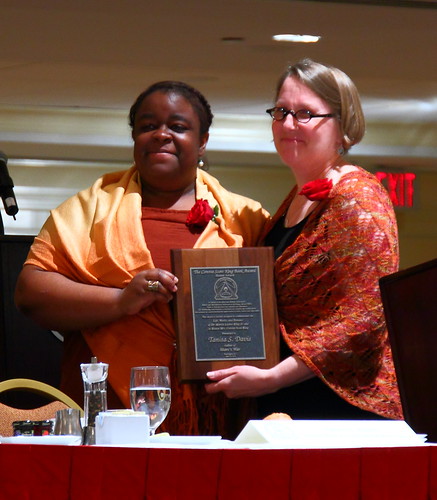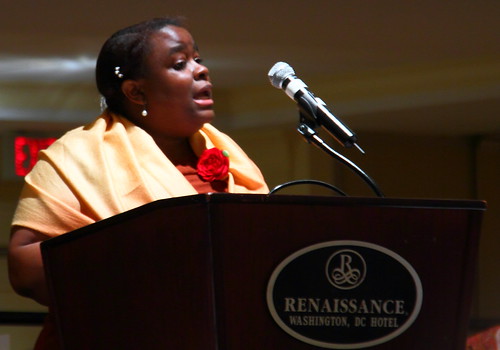The Coretta Scott King Awards Breakfast on the last Tuesday in June was a pageant of color and music and glorious words. And I sat and chewed off my lipgloss and sipped a glass of orange juice through most of it, scribbling frantically on a sheet of paper the words for a speech that I stopped reading as soon as I got on the platform.
If you get a chance, bug Kekla Magoon into telling you about her speech at the CSK Breakfast. It was so polished, so erudite, so thought-provoking that it completely freaked me out. Why didn’t I say something like that!?” I thought. (Answer from my subconscious: Um, maybe if your book was about brothers, militancy, the Black Panthers, and the 60’s, your speech would have been more like hers? Just a thought.) I started to panic. Of course, Kekla was before me. I scribbled revisions on my speech until Robin Smith got up to introduce me.
Uh-oh.
Thank God, it was well received. I was so nervous that I hardly remember the moment, except that the very gorgeous illustrator, E.B. Lewis, afterward said, “You were fantastic,” and I have to take his word for it, because I really sort of stepped out of time the minute I got in front of the microphone (and fortunately my mother forgot to film it! Bwa-hahahaha!). This is mostly what I said — I ad libbed, and only have my original notes to go on, but this is close:
By the time I was in junior high, it occurred to me that I hated history. I hated it because I was an African American student in a predominantly Caucasian school, and the only lives of African Americans to which I was exposed were people who were naked and poor, who were slaves and sharecroppers, who were lynched and beaten and victimized — at least, that’s how I saw it. Oh, how I wanted to see a people who did something other than work and die. I wanted to hear a story where my people lived. I wanted to see African Americans make history.
As some of you know, I first began researching and writing Mare’s War for my MFA thesis project at Mills College. Originally, the novel had all adult characters. Mare was a very old woman, lying on her death bed, reminiscing about days gone by. This was important, I thought. This was an African American woman surveying her own history!
And it worked. The story was well received by all of my thesis committee, and everyone was very, very polite.
And I …was bored.
…because, really, how original is it to write about an old woman who dies?
An old woman who lives, now, that’s a story.
And what a story — 800 African American women, sent across the Atlantic in stormy seas, to do a job they weren’t sure about in a country that most of them had never seen. They braved criticism from the male Army brass, slander from the newspapers back home, and their own fears to step forward and do something. They lived. They were real. They made history.
Every year in certain circles, the question is raised whether or not there’s really still a need for the Coretta Scott King awards; whether we still need to pay marked attention to the books that illuminate the stories of African American lives and history and futures. I maintain that as long as there are junior high students, starving for stories of African Americans who lived, and changed the world, this is necessary. As long as there are pieces of the American story and stories of African Americans which remain untold, this is vital. But more than necessary, this is a joy, is it not? This is a celebration.
I’m so grateful to the members of the Coretta Scott King Awards Committee who dedicate their time and attention to unearthing and celebrating those stories and to all of you who continue to read and share and support the making of great books for young people. I’m very grateful to my editor, Erin Clarke, Knopf’s fabulous book designer, Kate Gartner, and my agent, Steven Chudney, for all that they did to make this book possible. All of you, Thank you.

Librarian Robin L. Smith, Ensworth School Library, Nashville, TN, and me. (Both trying not to cry. I think we laughed as much as we sniffled that day.)
Afterward, I sat down with relief, and my thoughts ran along the lines of “I’m five feet from Charles R. Smith, Jr.!” and “Walter Dean Myers is right behind me!” and other fangirling nonsense. Boy was I glad the part where I had to say anything was over. I was tickled to listen to Vonda Micheaux Nelson (whose cute husband wore a ten-gallon hat and made cowboy hoots from the audience) and I really enjoyed Charles R. Smith, Jr., and his little riff on Twilight. (*snicker*) Snark is good, even that early in the morning.
I didn’t want to belabor the point on the platform when so many people were speaking after me, but I am so grateful to the Coretta Scott King Awards Jury. They were truly some of the nicest, funniest, most comfortable people EVER, and I got a chance to meet them on a one-to-one basis the morning before in our private breakfast. My editor remarked several times that, “Boy, that could have gone differently.” Not every committee gets on well, and not every author-committee breakfast is as comfortable and full of laughter and teasing as ours was. We sat and talked – seriously – like a happy family. So, thank you Carole McCollough, Eunice Anderson, Alan Bailey, Brenda Hunter, Jonda McNair, Martha Ruff and Robin Smith for generally being amazing and gracious people. I really, really enjoyed meeting you.
And I so much appreciated Editor E, who was doing all this schmoozing with me, plus getting up early with her two-year-old. I honestly do not know how she did it – but she was chipper and cheery every single day regardless.
Honestly, the ALA Convention was all the excitement I needed for the year. It was lovely, and I am so very glad it’s over.
